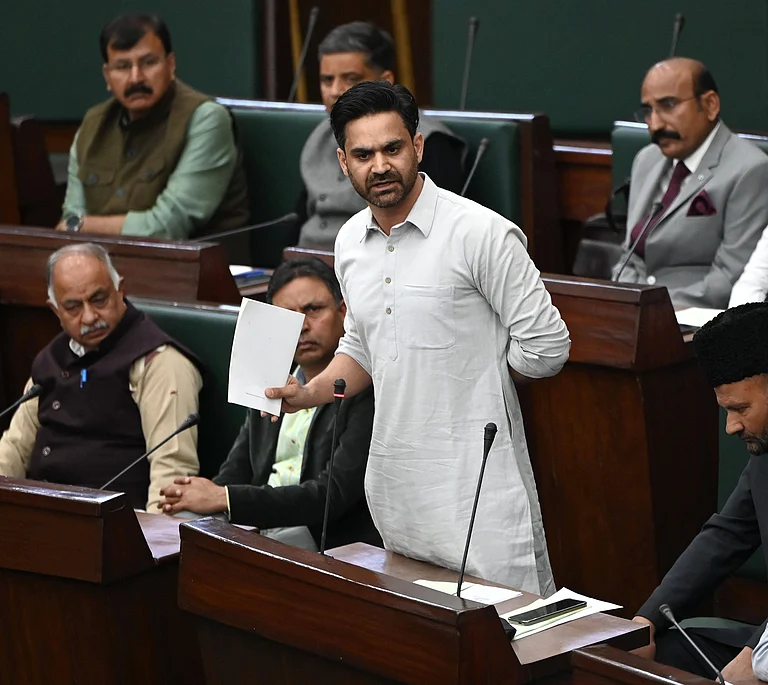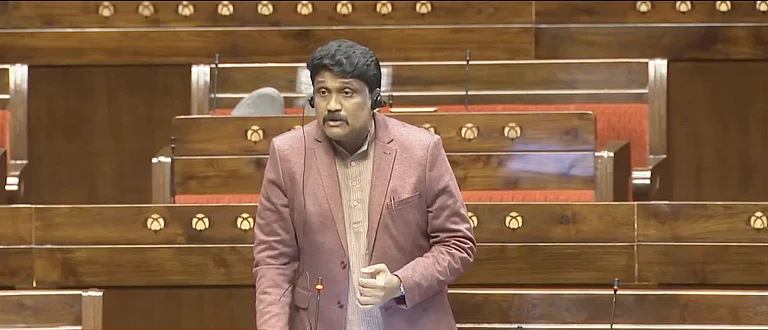Gifted with eloquence on the small and the quotidian, Amit Chaudhuri can make the crunch of gravel under foot, the distant opening and shutting of a door, or even a pile of chewed fish bones a poetic thing. He claims D.H. Lawrence "opened his eyes to (his) own temperament": his writing has Lawrence's celebratory attention to detail, but not the tense passion. Born in Calcutta, Chaudhuri, 36, lives and teaches in Cambridge. His first novel, A Strange and Sublime Address won the Betty Trask Prize and the Commonwealth Writers' First Book Prize, and Afternoon Raag won the Encore award for best second novel. In Delhi recently for the launch of Freedom Song, Chaudhuri spoke to Shoma Chaudhury about his art.
Firstly, it's less feted abroad than is represented here. After Seth and Roy it has some market potential, but in literary circles the excitement is much less. English liberals make enthusiastic noises, but when they really talk about writing, it's American writers like Raymond Carver or Jonathan Ford. I find it baffling myself. But the English do like reading the grand national narrative on India—it's part of their history, I guess.
But their interest is still underscored by the 'exotic'?
Yes, that's true.
And Indian writers feed into that?
I don't know if they do it consciously, but that's how their work is received there. Partly why the West is interested in the post-colonial Indian novel is because it is itself at a transitional, multicultural stage of its history and its intellectual world is concerned with hybridity. Fascism has made cultural exclusivity suspect. India provides the mirror image for that anxiety, the so-called hybrid thing. They don't realise all Indian languages have been hybrid all along, not just the Indian novel in English.
What do you think of this writing?
I've a problem with the pan-Indian novel, the novel of the national narrative, the post-colonial potboiler. It's almost prescriptive. That's something history and Rushdie have bestowed on us. There are exceptions: Sunetra Gupta, Vikram Chandra's Love and Longing in Bombay. But regional writing is far more sensuous. It suggests India by ellipsis, the mode is poetic, the popular form the novella rather than the pan-Indian blockbuster. I'm carping too much, but Indo-Anglian writing has been painted in such rosy hues, it's good to be realistic.
Isn't there also a lot of self-indulgent nostalgia? Your books too have more texture than plot.
Sights and sounds are important to me. Writing which renovates perception of the everyday and makes it new, the strong sense of place. There's a difference between mere description and atmosphere but there's a lot of the former inIndo-Anglian writing.
What did it feel like to be in the picture of leading Indian novelists in the New Yorker issue on India?
Silly. All of it was silly. It had such a self-congratulatory air, like we had all won the Rhodes.
Your books have a tranquil quality, untouched by trouble or passion. Does it reflect you?
I'm always attracted to serenity, tranquility as you put it. I think the more the inner turmoil, the more there is a tendency towards or an attraction for the expression of something tranquil. Satyajit Ray once said conflict and drama is at the core of western music. For me, the equanimity of classical Indian music, or some of the poetry that came out of India, Japan, or China, in which the completely unimportant moment in time becomes important, is more attractive. In modern writing this is connected to the urban world, the colonial city. Like Joyce who sets his epiphanies in Dublin, the presence of a colonial city is important to me.
Why a colonial city?
A colonial city is key to a flaneur imagination, an imagination which describes a city person who loiters about, picking up secondhand books from pavements. Like Virginia Woolf's Mrs Dalloway. The middle-class and its amateur existence is at the heart of a flaneur imagination and I'm a belatedflaneur.
Calcutta is integral to your writing. Yet you've been away a lot.
I didn't grow up there, but Calcutta is very seductive for me. I have an extended family there; I love the street life. In England I realised how much I missed the open windows, the street sounds, the desultoriness.
You use Bengali words liberally. Do you worry about using English to express an Indian context?
You can write a novel in classical English prose and be more Bengali than when you throw in pidgin for effect. I always check to see which word has more aesthetic life of its own. It's an artistic decision, not a theoretical one. Rushdie makes a lot of mistakes. He ascribes funny ways of talking to Goan Christians—things like 'wonderful thunderful'—but people don't speak like that. Eunice de Souza catches the cadences much better. One has to be very canny about the permutations.
Do you have an ideal reader in mind when you write?
Not when I write, but I do have an ideal reader. Someone who loves Virginia Woolf and Katherine Mansfield and Bibhuthibhushan Bandopadhay and therefore might have space for me in their world.






















